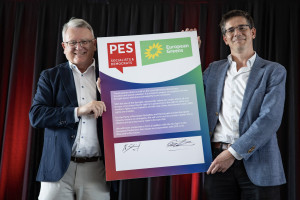PvdA International Secretariat – Reaction to the Dutch coalition agreement
Political Context
The new Dutch government (Fourth Rutte cabinet) is a continuation of the previous administration (Third Rutte cabinet). This concerns a renewed coalition of the People’s Party for Freedom and Democracy (VVD), Democrats 66 (D66), Christian Democratic Appeal (CDA) and Christian Union (CU).
Wopke Hoekstra (CDA) now assumes the position of Minister of Foreign Affairs. Sigrid Kaag (D66) now assumes the position of Minister of Finance. Rob Jetten (D66) assumes the new position of Minister for Climate and Energy; a minister without portfolio under the Ministry of Economic Affairs and Climate Policy.
Foreign and European Affairs
The government coalition wants to take strong action against countries that violate the democratic rule of law. The Dutch government will therefore no longer avoid taboos, such as treaty amendments, establishing front groups of willing countries on joint challenges, and abolishing vetoes.
We applaud the coalition’s explicit recognition of the importance to protect the European rule of law. We also welcome the firm commitment to national/international security, including the drafting of proposals for a European security council. We are, furthermore, very pleased that the agreement touches upon the need to recognise genocides together with like-minded countries.
We note with concern that while the agreement describes the increasing Great Power competition (between China and Russia) and the rise of authoritarian regimes, the coalition presents nothing to address these disturbing developments. We applaud the intensification of support to countries in the Western Balkans. We, however, note with disappointment the ongoing commitment to “strict and fair” policy as a basis for this support.
Defence / Foreign Trade and Development Cooperation
We applaud the intention to continue and deepen European cooperation, including high standards of fair production, human rights, food safety, sustainable growth and climate change in trade agreements.
We are pleased that the UN Sustainable Development Goals remain leading for Dutch development policies. We share the coalition’s commitment to the elimination of HIV and TB by 2030 and welcome the Africa strategy, aimed at stimulating equal economic development, reducing poverty, improving human rights and limiting irregular migration.
We criticize the lack of a separate arrangement to finance climate adaptation and climate mitigation. We are also deeply dissatisfied with the too limited increase of the development cooperation budget. Given the enhanced focus on regional security within NATO, we are concerned about The Netherlands’ continued commitment to fulfil NATO-wide obligations.
Migration
The PvdA is pleased that the free movement of people in the EU is not being questioned. We are delighted that the possibility of setting up a European front group with like-minded countries to relocate refugees is on the table. We are also pleased that migration partnerships will only be established with third countries that meet the conditions of the Refugee Convention. In the event of a humanitarian crisis and a substantially higher influx of migrants, the coalition thankfully pledges to also resort to relocation.
We express our discontent that there will definitely be no further relocation from Greece. Only efforts will be made to continue humanitarian aid on the Greek islands. We also reject the option of a “mini-Schengen” (cooperation with neighbouring countries) in times of crisis, as it undermines our international solidarity with the most affected states. The PvdA is deeply troubled by the great emphasis on the protection of external borders, without any regard for “pushbacks” or other human rights violations at European external borders.
Stability and Growth Pact / Recovery and Resilience Facility
The coalition agreement did not mince many words regarding the future of the Stability and Growth Pact (SGP). It acknowledges the importance of solid and prudent macro-economic24/01/2224/01/2022 policy. Future reforms of the SGP should be aimed at sustainable debt, economic growth and upward economic convergence. Economic reforms by member states should have these goals in mind as well. Finally, effective enforcement of any future agreements is considered important.
When it comes to fiscal policy of the coalition agreement under the current SGP, it should be noted that due to the Corona crisis the SGP is currently on hold. That said, the fiscal numbers provided, and assessed by the bureau of economic analysis (CPB), skirt the limits of the SGP. The deficit in 2025 is calculated at 2,7%, just below the 3% threshold. State debt in 2025 is expected to amount to 56% of GNP, again slightly below the threshold of 60%. The projected state debt in 2060 is expected to surge to 92%, with a structural deficit of 3,1%, well above the 0,5% that the SGP allows for the Netherlands.
The coalition agreement fully counts in its plans to receive the funds from the Recovery and Resilience Facility, and regards it as an integral part of State income. However, no plans were presented to apply for these funds. These proposals are still under development, making the Netherlands one of the last countries to apply. Furthermore, specific economic reforms required to be eligible for the funds were not provided. For example, the Commission suggested a comprehensive reform of the housing market and homeowners interest deduction; no significant reforms are included in the package at this moment.
Climate Affairs
We welcome the sense of urgency concerning climate change in the government plans and the reservation of a large budget. However, to do what is needed to tackle climate change, fundamental reforms are necessary rather than only subsidies.
A fair price on carbon emissions throughout all sectors, including the large industrial emitters, is crucial to a fair transition and the acceleration of decarbonisation and innovation. Moreover, the government plans miss the commitment to end energy poverty.
Gender Equality and Women’s Rights
The new Dutch coalition is set to take several steps that will improve gender equality in the Netherlands. The PvdA (Labour Party) welcomes such steps as increased funding for day care for children and pregnancy leave for both parents. A fundamental analysis of the causes of gender inequality are, however, lacking. And so are the solutions.
As an example, the new government will do nothing to close the persisting Gender Pay Gap between men and women. Necessary steps, such as the implementation of the Icelandic Model, are not supported in the coalition agreement. This model would require employers to implement equal pay standards within their company, and has been highly successful in reducing the gender pay gap in Iceland. Whether a PvdA initiative to this end can count on sufficient parliamentary support, remains doubtful unfortunately.
Moreover, the coalition government itself will take no steps to strengthen the reproductive rights of women. Instead the decision is left to parliamentary factions. As such, the PvdA has taken up the responsibility to put forward several bills to finally advance progressive values after years of standstill.



